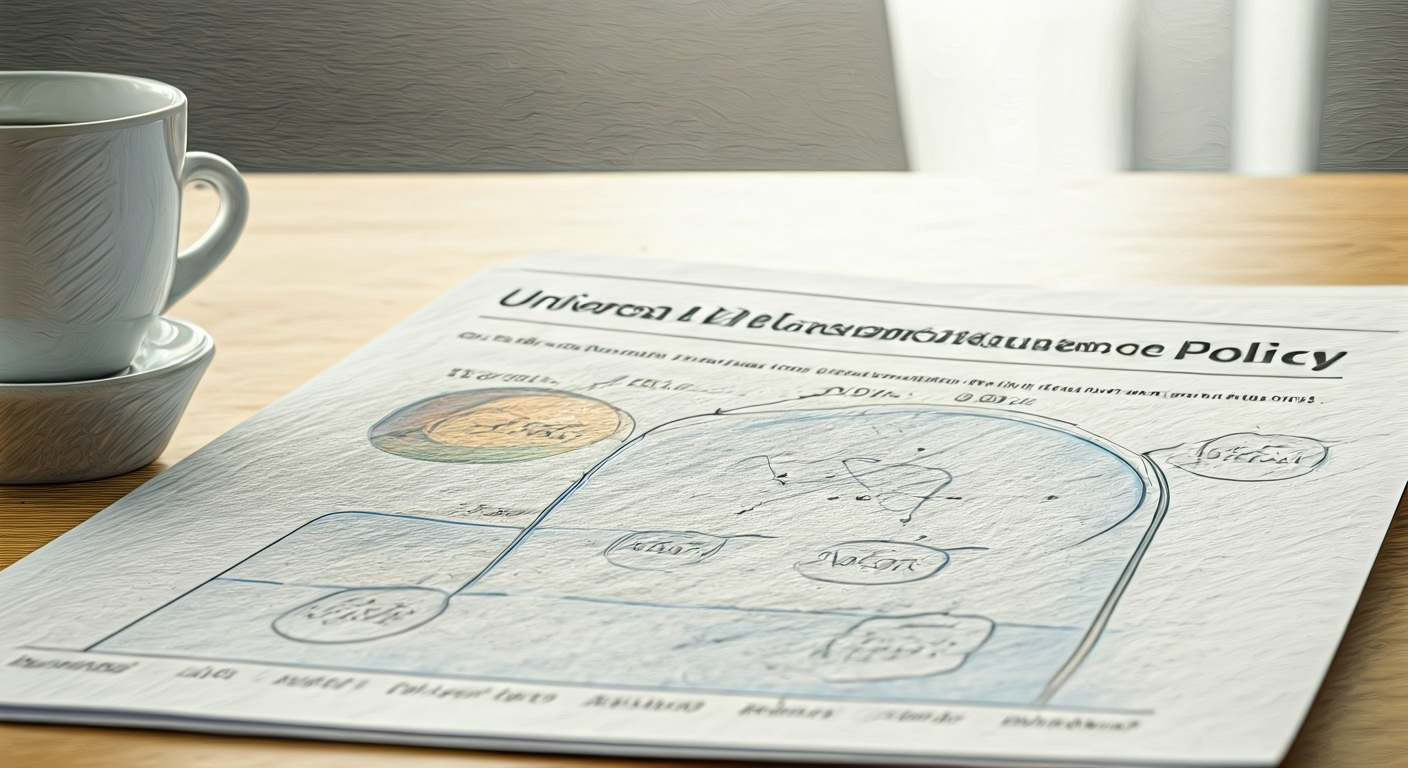
Key Highlights
- Universal life insurance combines permanent coverage with an investing element through cash value, offering life-long protection.
- Premium payments and death benefits can be adjusted, making it a flexible financial solution for policyholders.
- The policy’s cash value grows, which could enable loans or withdrawals during your lifetime.
- Four types exist: Indexed, Variable, Standard, and Guaranteed Universal Life Insurance, each suited to different financial needs.
- Ideal for business owners and individuals seeking coverage with long-term adaptability.
- Policy performance depends on insurance company management, interest rates, and, in some cases, market factors.
Introduction
Universal life insurance is a type of life insurance that gives you both permanent coverage and a way to grow money over time. This money is called cash value. With universal life, you can change how much you pay and also adjust the death benefits if your needs change. This makes it a good option for people who have different financial goals or want something that can change as they do. Universal life brings together both insurance protection and a chance to build up money, so it is a good fit for those who want more control over their life insurance policy. This blog will take a look at what universal life insurance is, what makes it different, and the benefits you get when choosing a trusted life insurance company.
What Is Universal Life Insurance?

Universal life insurance is a kind of permanent coverage that gives a death benefit your loved ones get without paying taxes. It also has a cash value part. This cash value can grow as time goes by. You can get to this money when you need it, by taking out loans or making withdrawals.
Term life insurance is not the same as universal life insurance. This coverage will not end as long as you pay what you need, when you need to. Universal life can change when your needs do. You can adjust your coverage amount or payment. This lets you keep the right protection for you and your family. With universal life, there is always some safety. The people you pick as beneficiaries will get the right payout after you die.
Defining Universal Life Insurance
Universal life insurance is a type of permanent life insurance. It gives you both protection and a way for your money to grow. With this life insurance, your loved ones get the death benefit when you die. At the same time, the policy has a cash value that can go up over the years without being taxed.
The main benefit of universal life is how flexible it can be. You can change how much you pay for your premiums, based on what is best for you at the time. You also have the option to take out loans or withdrawals from the cash value if you need money during hard times.
Compared to other kinds of permanent life insurance, universal life gives you more choice. It lets you control how much you pay and how much coverage you will get. This type of life insurance works well if you need safety for your family and want the chance for your money to grow, too.
Key Differences from Other Life Insurance Types
Universal life insurance is different from whole life and term life insurance. Whole life gives you set payments and sure cash value growth, but does not have premium flexibility that you get with universal life.
Term life insurance covers you for a set amount of time. There is no cash value and no investment part. Universal life will give you permanent coverage. It mixes coverage that lasts your whole life with savings, making it more flexible.
If you want a life insurance option where you can manage your payments and change the death benefit, universal life is a good choice. It can adjust as your money and needs change over time.
How Universal Life Insurance Works

Universal life insurance uses flexible premium payments. These payments help cover the cost of insurance and add to the policy’s cash value. The cash value grows as time goes on. It is affected by interest rates set by the insurance company and by outside indexes.
People who have this type of life insurance can change how much they pay in premiums and also the amount of death benefits. This helps the coverage fit their needs as they change. This setup makes universal life insurance different from other life policies. It mixes insurance protection with the chance for cash value to grow over time.
Structure of Premium Payments
The flexible premium payment system in universal life insurance is what makes it stand out. You can pay just the minimum amount to keep your life insurance, or you can pay more to grow your policy’s cash value.
Every time you make a premium payment, the money is split. Some pays for the insurance itself, some goes to pay charges, and the rest is added to the policy’s cash value. This way, your life insurance can stay active if you don’t pay for a month, as long as there is enough built-up cash value to cover the costs.
This flexible premium payment set-up is a good choice for people who have incomes that go up and down. It gives you the freedom to manage your payments and helps keep you covered without a break in your life insurance.
The Role of Cash Value in Universal Life Policies
The cash value in a universal life insurance policy works like a savings account. You put in your premiums, and the money grows without being taxed. The cash value growth depends on interest rates set by the insurance company or is tied to indexes. This way, you can get more out of your life insurance policy.
You can use the cash value in times when you need money fast, like for an urgent situation or if you find a good investment. This is possible through policy loans or withdrawals. But when you do take money out, it will reduce the death benefit by the same amount.
It is important to keep an eye on the cash value. If your account goes down too far, your universal life insurance policy might not last. In that case, you could have to pay extra to keep your life insurance active.
Types of Universal Life Insurance

Universal life insurance is available in a few types to meet different money needs. The main ones are Indexed Universal Life (IUL), Variable Universal Life (VUL), and Guaranteed Universal Life (GUL).
Each type of universal life policy has its own ways to grow value and its own risks. GUL is for those who want steady coverage that does not change much. VUL lets you choose how to invest, so there is more freedom but also more risk.
When you know the difference between each life insurance policy, you can pick the one that fits what you need and want most. That way, your choice in universal life insurance works better for you and your goals.
Indexed Universal Life Insurance (IUL)
Indexed universal life insurance, or IUL, is a type of permanent life insurance. It gives you a flexible premium and a death benefit like what you get with universal life insurance. But with IUL, the cash value can grow because it is linked to a stock market index. You get a guaranteed interest rate, so you always earn something on your cash value, even if the market is down. If the market does well, you might earn more. This gives you the potential for more cash value growth.
An IUL from an insurance company often comes with a lapse guarantee. This means that you are protected from the policy lapsing in certain short periods. It helps manage the risk of losing your policy early. While you are getting all these features, you will also need to pay administrative fees and company charges. But with a flexible premium and other the benefits, many people think IUL is a good choice for long-term coverage.
Variable Universal Life Insurance (VUL)
Variable universal life insurance, or VUL, is a type of permanent life insurance that mixes flexibility and the chance to grow your money. With this universal life option, you can change your premium payments and death benefit as you need to. VUL gives you many underlying investment options, like mutual funds, so the cash value in your life insurance policy can grow. But you need to know that how well these investments do can make a big difference in the policy’s cash value and in your death benefit protection. VUL puts greater risk on you because if you do not watch how your policy does, it could end up with large cash surrender values or even lead to policy lapses.
Guaranteed Universal Life Insurance (GUL)
Guaranteed universal life insurance (GUL) is a type of permanent life insurance. It gives you both lifelong coverage and steady death benefit protection. This means that, no matter when you die, your loved ones will get a death benefit. GUL is different from whole life insurance because it does not put focus on building cash value. Instead, it is all about keeping the death benefit strong for your family.
With GUL, you usually have fixed premium payments. This helps you plan your budget because you know what to pay every time. You do not have to worry about sudden increases. This kind of permanent coverage is good for people who want simple, lifelong protection. It is made for those who want the peace of mind that comes from a type of permanent life insurance without needing to think about cash value or extra features you find in some other universal life policies.
Flexibility and Customization Options
Universal life insurance stands out because you can change it to fit your needs. You are able to change the premiums and the payout if something in your life changes, but you will not lose coverage.
Also, you can add different options, called riders, to the policy. This lets you fit the life insurance more to what you want or need. With these things, universal life offers a good, flexible choice for many people who want plans that can change when they need them to.
Adjustable Premiums and Death Benefits
Universal life insurance gives you the choice to change how much you pay, depending on your money situation. You can pay more to build up your cash value faster, or pay less if you have a tough time and need extra money.
Also, with approval, you can raise or lower the death benefit. This way, your life insurance can fit with where you are in life and what you need. Being able to make these changes is what makes universal life stand out.
This means you can shape your life insurance so it meets your changing goals and needs over time.
Policy Riders and Additional Features
Universal life insurance lets you add extra options, called riders, to your policy for an additional cost. Some the most common riders you can get are:
- Accidental death benefit rider: Gives extra money if the insured’s death is caused by an accident.
- Waiver of premium rider: If the insured becomes disabled, they do not have to pay premiums.
- Child or spouse rider: Adds coverage for a child or spouse as part of your life insurance.
- Accelerated death benefit rider: Lets you get some of the death benefit early if you get very sick with a terminal illness.
By adding these riders, you get more out of your universal life policy. They help your coverage fit your needs better and give you more ways to protect your loved ones. These extra tools may cost more, but many people find the extra peace of mind to be worth it.
Pros and Cons of Universal Life Insurance
Looking at the advantages and limitations of universal life insurance can help you see if this type of life insurance policy is right for you. Some good things about universal life are that you get flexibility in paying premiums. Also, there is the chance for cash value growth, and it offers lifelong coverage.
But there are some things to watch out for. You may have to pay administrative costs, and your policy could end if the cash value is not big enough to cover the cost. So, be sure to think about these things before you choose universal life as your permanent life insurance policy.
Advantages of Universal Life Insurance
Universal life insurance comes with some big benefits:
- Flexible premium payments: You can change your payments when your finances change.
- Permanent protection: This gives you coverage for your whole life, plus your family gets a tax-free death benefit.
- Cash value utilization: The policy builds up savings over time, and you can use it through loans or by making a withdrawal.
- Customizable additions: You can add riders to your policy to make it work better for you and your needs.
With these features, universal life insurance gives you the security you want, plus ways to grow your money or adjust your plan. It gives you confidence, knowing you and your loved ones are covered.
Potential Drawbacks and Risks
Universal life insurance comes with some drawbacks:
- Risk of policy lapses: If the cash value is not high enough, the policy may stop.
- Rising costs: The money you pay for premiums and administrative fees goes up as time goes by.
- Dependence on performance: If the market does not do well or interest rates stay low, the cash value growth will slow down.
- Tax issues: When you take out loans or withdraw money, your benefits might get smaller, and you may need to pay extra tax.
To get the most out of universal life insurance and avoid problems like policy lapses, you need to manage it well and keep an eye on the cash value and administrative fees.
Comparing Universal Life Insurance to Other Policies
Universal life insurance is known for being more flexible than whole life and term insurance. Term policies only cover you for a set time, but universal life gives you coverage for your whole life. It also has an option to save money, which you will not get with all other plans.
Whole life insurance gives you steady growth. With universal life, you can choose how much to pay and change your death benefit as needed. Because of these things, universal life insurance can be a good choice if you want something that fits your needs.
Universal Life vs. Whole Life Insurance
Both universal life and whole life insurance are types of permanent life insurance. But they are not the same. Whole life insurance gives you a set premium and steady cash value growth. It stays the same, so you know what to expect. But it does not let you change much, and that can be a drawback if you want more choice in how you invest.
Universal life insurance is different. With universal life, you get flexible premiums. You can also change your death benefit. That gives you more say in your financial plan. The cash value growth here can be higher at times. This is because its cash value may go up based on interest rates or how the market does. This makes universal life insurance better for people who want to adjust their policy as money needs change.
Universal Life vs. Term Life Insurance
Universal life insurance gives you permanent coverage and comes with a cash value part. It lets you have more choice with how you pay your premiums and also lets you change the death benefit. This type of life insurance can work well for people who want coverage that lasts their whole life, and also want to see possible cash value growth over time.
On the other hand, term life insurance gives a death benefit only for a set amount of years. It usually costs less at first, but it does not have a cash value. When people get older or their money needs change, choosing between term life insurance or universal life depends on what they want from their coverage, how they want to use their cash value, and their money plans for the future.
Conclusion
To sum up, universal life insurance mixes flexibility with permanent coverage. This type of plan can work well for many people. It offers the chance for cash value growth and lets you change premium payments. This makes universal life a good option for business owners who need something that can adapt.
There are different kinds of universal life insurance. These include indexed, variable, and guaranteed policies. Knowing about these options helps you make smart choices for your needs.
As your financial needs change over time, it is important that the life insurance company can handle all these parts. This makes sure your universal life policy stays right for your long-term plans.
Frequently Asked Questions
What are the main benefits of universal life insurance?
Universal life insurance is a type of life insurance that gives people more control. You can change the amount of your premium payments, and also change the death benefit as your needs change. This kind of policy also builds up cash value over time. That cash value grows without tax, so you can use the money later if you need it. With universal life insurance, you get cash value and a death benefit, plus coverage for your whole life.
Can I borrow money from my universal life insurance policy?
Yes, you can get a loan from your universal life insurance policy. The cash value in your universal life insurance builds up over time. You can borrow money against it when you need to. But if you do not pay back the loan, it can cut down your death benefit and make you pay more interest. Always talk to your life insurance company before you borrow money from your life insurance policy.
How does cash value accumulation work in universal life insurance?
Cash value builds up in a universal life insurance policy when you pay your premiums. A part of the payment goes to the cost of the life insurance, and another part goes to the cash value account. The cash value can grow as time goes by because of interest rates or how the market is doing. This lets you get money from the policy if you need it.
What is the difference between indexed and variable universal life insurance?
Indexed universal life insurance (IUL) helps the cash value grow by linking it to a stock market index. This gives you a chance for higher returns, but it still keeps your life insurance safe. With variable universal life (VUL) insurance, you can put your cash value into different kinds of investments, not just a stock market index. This way, returns can go up or down a lot, but you might also get bigger returns. Both types of universal life insurance have their own good points. They let people use cash value in ways that fit their needs.
Is universal life insurance a good investment for everyone?
Universal life insurance is not the best choice for all people. This is because it can be confusing and sometimes costs more. Before you get universal life insurance, you need to think about your money goals, how much risk you can take, and what you know about investing. It is important to see if this kind of life insurance fits well with your long-term money plans.

